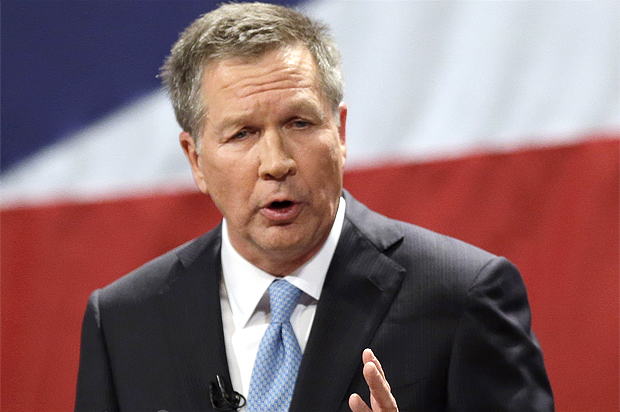Just in case you were concerned that we’d run out of Republican presidential candidates, fear not – there’s at least one more to throw on the pile. Later today, Ohio Gov. John Kasich will officially launch his long-shot bid for the White House. He’ll enter the race with somewhere between 1 and 2 percent support in the national polls, putting him in the same tier as the hopeless dreamers (Rick Perry, Carly Fiorina), the angry has-beens (Bobby Jindal, Rick Santorum), and the best candidate who ever lived (Lindsey Graham).
Kasich’s entrance into the race only serves to highlight the bizarre nature of the Republican primary and its overcrowded field. If polls remain consistent, Donald Trump and Ben Carson will earn invitations to the first primary debate, while Kasich will join several other sitting and former Republican governors and senators who will be shut out from participating. He also represents a significant outlier in the 2016 Republican field: Kasich is a pro-Obamacare candidate vying for the GOP nomination.
Kasich, of course, wouldn’t characterize himself as such. Ask him what should be done about the Affordable Care Act and he’ll tell you that it should be repealed as soon as is practicable. After all, he’s a Republican, and that’s what Republicans say. But Kasich also embraced the Affordable Care Act’s expansion of Medicaid in his state, and he did so when Republican opposition to Obamacare was at its height. His rationale was simple: the money’s there, and even though he doesn’t agree with the law, he felt it was his responsibility as governor to do what he could to help the poor residents of Ohio. And the results have been undeniably positive: Hundreds of thousands of Ohioans signed up, instances of uncompensated care at Ohio hospitals have plunged, charity care in the state is declining, and the statewide uninsurance rate has fallen sharply. All the while, Kasich has been needling his conservative and Republican critics by arguing that his Obamacare-assisted efforts to help the poor are guided by his faith.
At the same time, Kasich has been trying to argue that the expansion of Medicaid doesn’t really count as “Obamacare,” and that it would survive if the ACA were repealed. That doesn’t make any sense, and his fellow Republican candidates are surely going to point that out, given that chance. They’ll also almost certainly zero in on a comment Kasich made just this week in an interview with Yahoo News’ Matt Bai. Asked if he agreed with anything President Obama has done while in office, Kasich volunteered the fact that health insurers can no longer deny coverage based on pre-existing conditions – a key plank of the Affordable Care Act. “Eliminating pre-existing conditions so you can have health insurance, I think, is good,” Kasich told Bai. “It’s a very good thing.”
Endorsing two critical features of the Affordable Care Act may cause Kasich some political heartburn, but his presence in the race will highlight just how untenable the standard flavor of unyielding opposition to Obamacare is. Even as most of the other Republican candidates howl about repeal and attack governors like Kasich (and New Jersey’s Chris Christie) who expanded Medicaid, the reality is that resistance to the Affordable Care Act is breaking down as deep red states that once opposed expanded Medicaid are coming around to the benefits of the law.
Montana approved its expansion in April. Alaska’s Republican-turned-Independent Gov. Bill Walker announced last week that he’d push through the Medicaid expansion using his executive authority. Republican officials in Utah just announced that they’d agreed on a framework for expanding the program. Those states join Michigan, Indiana, North Dakota and, of course, Ohio in the growing club of Republican-led states that are overcoming ideological resistance to the law and finding ways to take advantage of its benefits.
It could very well be the case that, with such a large field vying for attention from donors and voters, Kasich’s candidacy will never find its legs and he’ll quietly quit the race without having an opportunity to make an impact. That would be a shame. He’ll be criticized heartily for his policy choices because the party is still held hostage to the fantasy of total repeal, but Kasich was ahead of the curve among Republicans when it came to healthcare reform and the Affordable Care Act.

